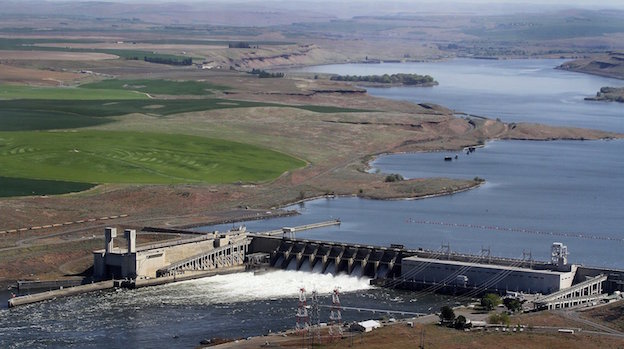forum
library
tutorial
contact

Gov. Brown
Puts Salmon at Risk
by Kurt Miller
Statesman Journal, November 27, 2020
|
the film forum library tutorial contact |

|
Gov. Brown
by Kurt Miller
|
The move also hints at a disbelief in climate science.
 Over Thanksgiving week, the state of Oregon very quietly filed a 60-day notice of its intent to sue the federal government over its planned Columbia River System Operations.
Over Thanksgiving week, the state of Oregon very quietly filed a 60-day notice of its intent to sue the federal government over its planned Columbia River System Operations.
This move might not sound like news if you're accustomed to over a decade of Pacific Northwest salmon litigation, but the quiet nature of this legal filing -- no press statement or public notice on the state of Oregon website -- is in stark contrast to the magnitude of its implications.
This filing is important because Gov. Kate Brown recently co-authored a letter with the governors of Washington, Idaho and Montana that committed to collaboratively working with regional stakeholders to help restore healthy salmon populations to the Columbia Basin.
The announcement of the "Four-State Process" was welcomed with universal support because it advanced the region's desire to move away from endless legal battles so that we can work productively together to help struggling salmon populations.
For this reason, Brown's move to preserve Oregon's option to litigate seems out of place. It sends the message that, "I'm really committed to collaboration, until I'm not."
More plainly, as a co-convener of the Four-State Process, and presumably, as one of four parties with the final say in discussion outcomes, it sends a clear and chilling signal to other stakeholders. That signal is that the governor will sue if she doesn't get her way, which will likely incent more organizations to lawyer up.
The move also hints at a disbelief in climate science. Numerous scientific studies published in 2019 and 2020 point to changing ocean conditions caused by climate change as the likely driver behind salmon declines over the past 50 years. Yet Brown seems fixated on the four Lower Snake River dams.
While Northwest RiverPartners applauds Brown's recent agreement to help remove the Klamath River dams, the lower Snake River dams are much different. The lower Snake River dams produce roughly 1,100 average megawatts of carbon-free electricity compared to the Klamath River dam's 78 average megawatts. Additionally, the lower Snake River dams have some of the most advanced fish passage systems in the world, whereas the Klamath River dams completely block the river to salmon migration.
We've heard from Brown that breaching the four lower Snake River dams represents the best chance for salmon recovery, but she never says how significant that chance is. Indeed, she cannot, because there is no scientific proof that these dams are the limiting factor in salmon restoration.
Brown made such a convincing case that this year's devastating wildfires were a direct result of climate change, and yet she seems unwilling to accept that climate change may be devastating to salmon as well. This cognitive dissonance is especially bad for salmon because it would have us destroy an important carbon-free resource in the process.
Nothing about the governor's other policies indicate that we should have a fatalistic attitude towards climate change, so it doesn't make sense to throw in the towel and risk the loss of these carbon-free resources.
We urge Brown to reconsider Oregon's litigious overture. She must set an example that shows she is committed to leading the region in a new collaborative direction, not back through courtroom doors.
learn more on topics covered in the film
see the video
read the script
learn the songs
discussion forum
